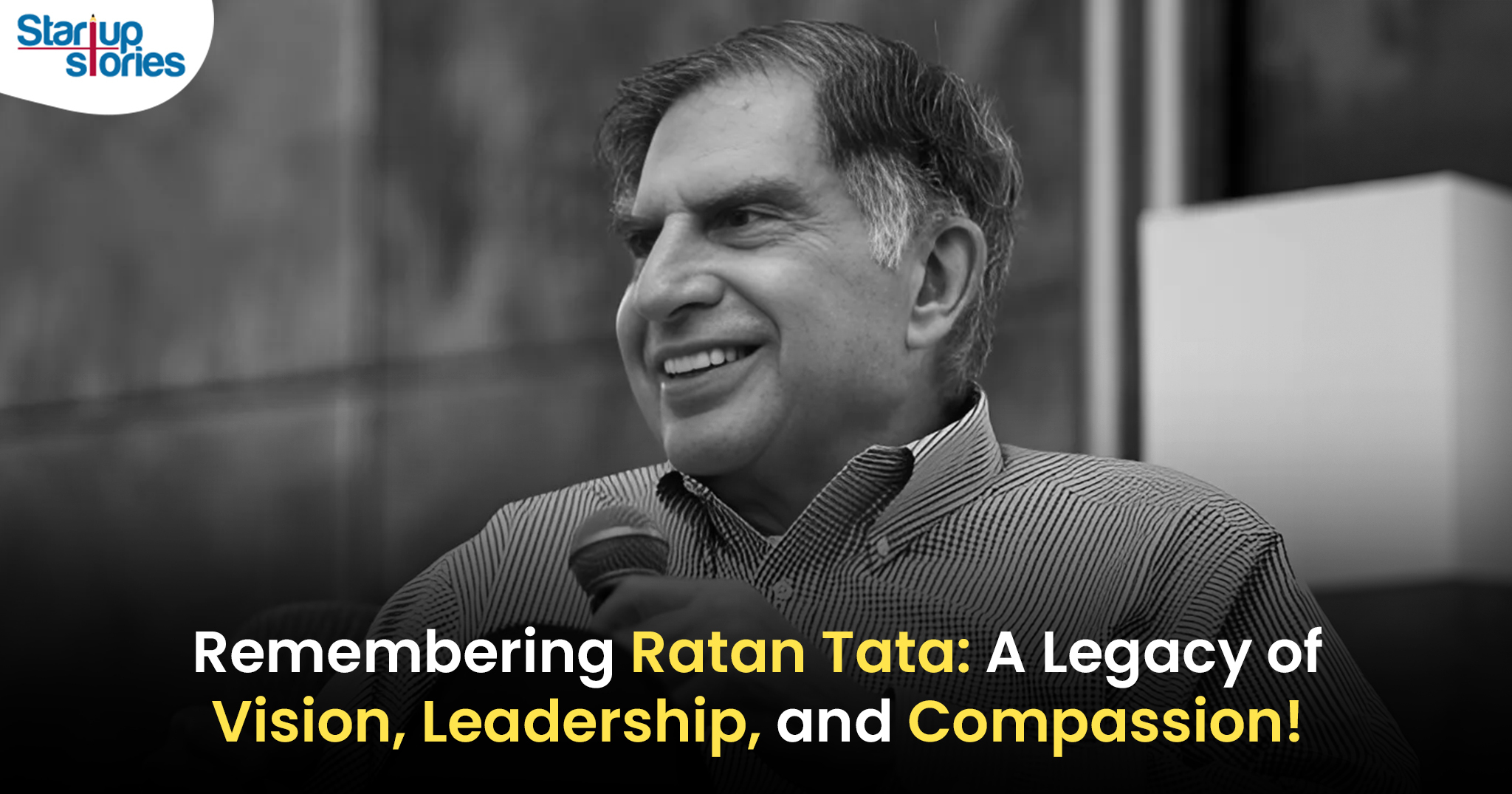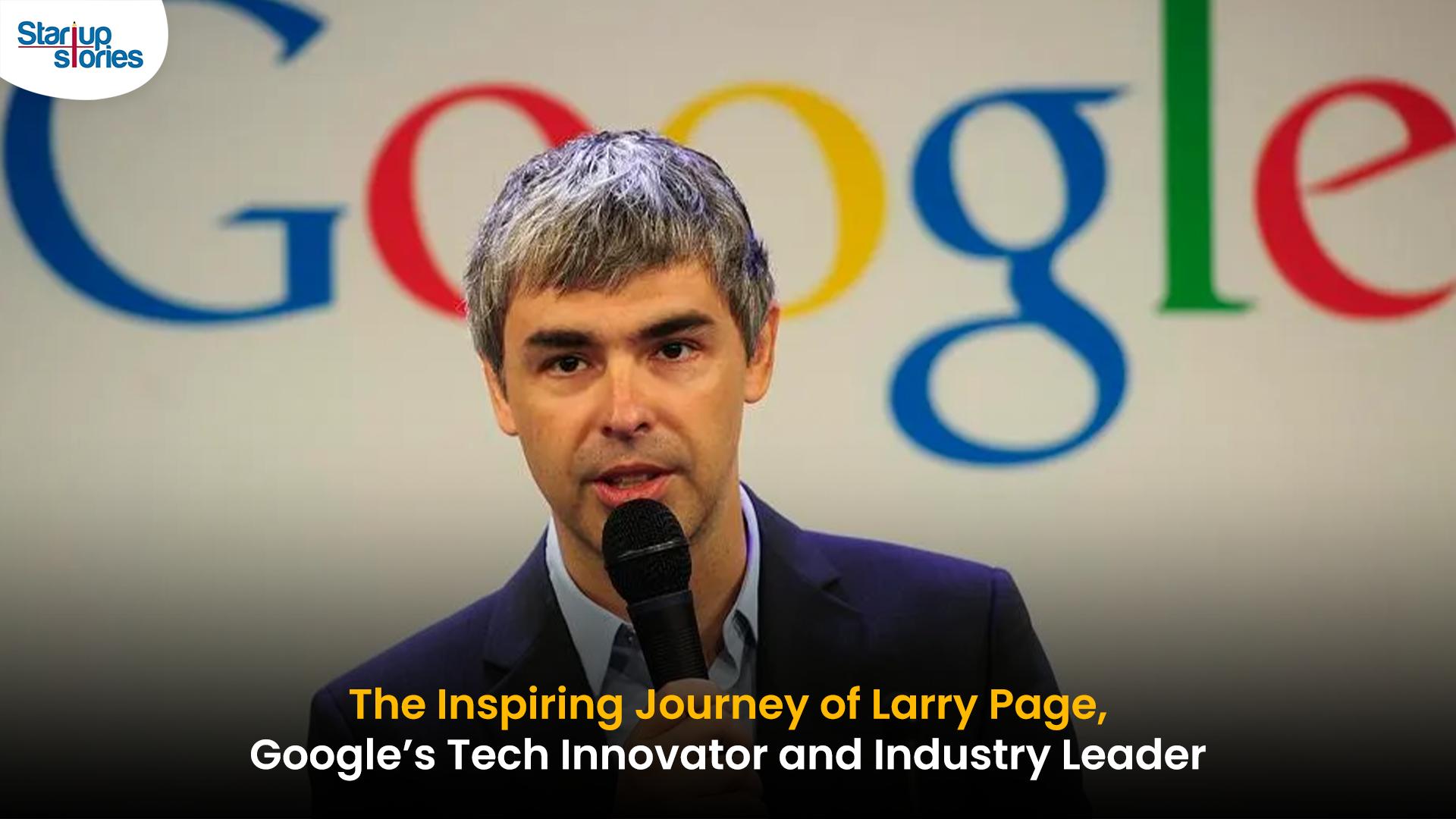Entrepreneur Stories
Remembering Ratan Tata: A Legacy of Leadership, Innovation, and Philanthropy!

Ratan Tata, the revered former chairman of Tata Sons, passed away on October 9, 2024, at the age of 86. His death signifies the conclusion of an influential era for both the Tata Group and the Indian business landscape as a whole.
A Legacy of Transformation
Born on December 28, 1937, in Navsari, Gujarat, Ratan Tata was the great-grandson of Jamsetji Tata, the founder of the Tata Group. He assumed leadership as chairman in 1991 during a critical period of economic liberalization in India. Under his stewardship, the Tata Group diversified into various sectors such as IT, steel, automobiles, and hospitality. One of his notable achievements was the launch of the Tata Nano in 2008, which aimed to provide affordable transportation to millions.
Tata’s strategic vision led to significant global acquisitions, including Jaguar Land Rover and Tetley Tea, transforming the Tata Group into a $100 billion conglomerate by 2012. His tenure saw over 60 acquisitions that expanded the group’s international footprint and solidified its place on the global stage.
Philanthropic Endeavors
Beyond his business prowess, Ratan Tata was deeply committed to philanthropy through the Tata Trusts. His contributions significantly impacted healthcare, education, and rural development initiatives across India. His dedication to social causes earned him prestigious accolades such as the Padma Bhushan in 2000 and the Padma Vibhushan in 2004.
Tata championed entrepreneurship by investing in startups and fostering innovation through initiatives like Tata Capital and Tata Start-up Hub. Reports suggest he donated around 60-65% of his income to charitable causes, underscoring his commitment to societal betterment.
Tributes and Mourning
The announcement of Ratan Tata’s passing prompted an outpouring of tributes from leaders across various sectors. Prime Minister Narendra Modi described him as “a visionary business leader” whose contributions were “immeasurable.” Mukesh Ambani and Sundar Pichai also expressed their condolences, emphasizing Tata’s role in elevating India’s presence on the global stage.
The Chief Minister of Maharashtra announced that Tata would receive a state funeral in recognition of his invaluable contributions to Indian society and industry. Social media platforms were flooded with tributes under hashtags like #RatanTata and #EndOfAnEra, reflecting the profound impact he had on countless lives.
Conclusion
Ratan Tata’s death is not merely a loss for his family and friends; it represents a significant loss for a nation that viewed him as a guiding light in both business and philanthropy. His legacy will continue to inspire future generations as they navigate the complexities of industry and social responsibility. Ratan Tata may be gone, but his remarkable life and contributions will be remembered for years to come.
As India mourns this great leader, it is vital to reflect on his enduring impact—one that transcended corporate boundaries and touched lives across various sectors. Ratan Tata leaves behind a legacy characterized by integrity, compassion, and an unwavering commitment to upliftment.
Videos
T.N. Seshan: The Fearless Reformer Who Redefined Indian Democracy

T.N. Seshan’s name stands tall in India’s history as the man who transformed the nation’s electoral system with extraordinary courage and integrity. Born in 1932 in Kerala, Seshan grew up with values of discipline, education, and service to the nation — virtues that shaped his illustrious journey. From his early brilliance at Madras Christian College to his advanced studies in public administration at Harvard University, Seshan’s path reflected rare determination and intellect. Joining the Indian Administrative Service in 1955, he built a reputation as a no‑nonsense officer committed to efficiency and honesty, serving in key roles such as Secretary of Defense and overseeing vital national programs.
As the Chief Election Commissioner of India in 1990, T.N. Seshan sparked a new era of electoral integrity. In a system once marred by corruption, violence, and malpractice, Seshan brought order, fear, and respect through his groundbreaking reforms. He introduced voter ID cards, imposed strict spending limits on campaigns, and insisted on transparency at every level of the election process. Despite criticism from political circles that labeled him dictatorial, his relentless pursuit of fairness empowered every citizen to vote fearlessly. Under his leadership, the Election Commission became a symbol of strength and integrity in Indian democracy.
Seshan’s passing in November 2019 marked the end of an era, but his message continues to resonate across generations. Leaders from every corner of the country mourned the loss of the man who restored faith in free and fair elections. His enduring legacy reminds us that true leadership lies not in wielding power, but in serving people with honesty, courage, and conviction. T.N. Seshan’s life remains a timeless inspiration a reminder that democracy thrives only when its citizens are vigilant, responsible, and fearless.
Entrepreneur Stories
Indian Man Quits JPMorgan, Takes 70% Pay Cut to Launch $6 Million Startup

Leaving behind a high-paying job at JPMorgan, an Indian entrepreneur embraced a 70% salary cut to pursue true purpose and passion in the startup world. Disenchanted with what he described as a “robotic” corporate routine, he sought meaningful work that made a real impact. This pivotal decision marked the beginning of his new journey, one focused on value creation rather than titles and corporate perks.
Powered by resilience and fresh perspective, the entrepreneur launched his own startup, prioritizing innovation and hands-on solutions. The road was challenging, but his vision resonated with the market: the startup quickly gained traction and raised $6 million—an impressive acknowledgement of its potential in a competitive landscape. Every hard lesson from early setbacks and bootstrapping paid off in real customer growth and investor confidence.
Today, his journey stands as an inspiring example for professionals seeking authentic success outside the corporate grind. By trading comfort for creative freedom, he grew a venture that solves important problems, generates jobs, and builds wealth beyond just salary. For ambitious founders, his story highlights the power of risk-taking, adaptability, and relentless focus on impact in India’s thriving startup ecosystem.
Videos
Larry Page: The Visionary Co-Founder Behind Google’s Global Success

Larry Page is a visionary technology entrepreneur and co-founder of Google, one of the world’s most influential companies. Born in 1973 in Michigan, Page grew up surrounded by computer technology, which inspired his passion for innovation from an early age. He studied computer engineering at the University of Michigan and later pursued his PhD at Stanford University, where he developed the revolutionary PageRank algorithm with Sergey Brin. This technology fundamentally changed the way search engines rank websites, making Google the most accurate and popular search engine globally.
The journey of Larry Page and Google began in 1998 when they officially launched the search engine from a small garage. Leveraging their unique algorithm, Google quickly surpassed competitors due to its ability to deliver highly relevant search results, transforming internet search forever. Under Larry Page’s leadership as CEO, Google expanded beyond search to launch groundbreaking products including YouTube, Gmail, and Google Maps, turning it into a global tech powerhouse that shapes how we access and interact with information online.
Larry Page later became the CEO of Google’s parent company, Alphabet Inc., driving innovation and investment in next-generation technologies such as artificial intelligence, autonomous vehicles, and healthcare solutions. His visionary leadership and commitment to technological advancement have cemented his legacy as one of the most influential figures in the tech industry. Today, Larry Page remains a key influencer in shaping the future of technology and digital innovation worldwide.














binance doporucení
February 23, 2025 at 10:56 am
Your article helped me a lot, is there any more related content? Thanks!
binance code
March 9, 2025 at 12:17 am
Your point of view caught my eye and was very interesting. Thanks. I have a question for you.
Binance开户
April 20, 2025 at 12:58 am
Your article helped me a lot, is there any more related content? Thanks!
Jqlweuse
May 23, 2025 at 8:47 am
Explore the ranked best online casinos of 2025. Compare bonuses, game selections, and trustworthiness of top platforms for secure and rewarding gameplayBonus offer.
binance
May 26, 2025 at 4:08 pm
Your article helped me a lot, is there any more related content? Thanks!
Skapa ett gratis konto
June 5, 2025 at 5:39 pm
Thank you for your sharing. I am worried that I lack creative ideas. It is your article that makes me full of hope. Thank you. But, I have a question, can you help me?
6zkkq
June 7, 2025 at 3:46 am
cheap clomid pills order clomiphene without insurance can i order generic clomiphene without insurance where buy generic clomiphene tablets cheap clomiphene prices can you get generic clomiphene prices how to get clomid no prescription
godlgfkev
July 18, 2025 at 9:23 pm
Mídia: EXCELENTE Elvis Presley – Beyond The Bend – 21808 Seu carrinho está vazio! Descrição: TRACKS: 1-CAVALEIRO ANDANTE 2-16 TONELADAS 3-SWING BRASIL 4-GOSTOSA MALUCA 5-BOCA LOUCA 6-FILOSOFIA DE QUINTAL 7-CIRCO MARIMBONDO 8-MEU SAMBA 9-KATARIN 10-CAROLINA CAROL BELA 11-FRASES 12-KID BRILHANTINA 13-FALADOR PASSA MAL 14-VOZES 15-VESTIDO DE PRATA 16-SEGURA NEGA 17-A BELEZA E VOCE MENINA 18-BECO SEM SAIDA 19- PONTO DE ENCONTRO 20-BALANCO DO NAVIO Descrição: TRACKS: – SULTANS OF SWING – LADY WRITER – ROMEO AND JULIET – TUNNEL OF LOVE – PRIVATE INVESTIGATIONS – TWISTING BY THE POOL – LOVE OVER GOLD – SO FAR AWAY – MONEY FOR NOTHING – BROTHERS IN ARMS – WALK OF LIFE – CALLING ELVIS – HEAVY FUEL – ON EVERY STREET – YOUR LATEST TRICK LIVE – LOCAL HERO Meghan Trainor – All About That Bass – 23260
https://toughergo.in/review-do-lucky-jet-da-1win-o-painel-de-controle-e-seus-recursos-para-jogadores-brasileiros/
Se você quer jogar Big Bass Splash demo sem gastar dinheiro, pode buscar por versões de teste que permitem rodadas grátis. Abaixo, listei algumas opções confiáveis onde você pode experimentar o jogo gratuitamente. Uma das características mais emocionantes do Big Bass Splash é a sua variedade de símbolos temáticos. Desde os tradicionais símbolos de cartas até ícones mais alusivos à pesca, como peixes, varas de pesca, caixas de isca e libélulas, há uma infinidade de possibilidades de ganhar. Além disso, o jogo oferece aos jogadores a chance de ganhar um prêmio máximo de até 5.000 vezes o valor da aposta inicial, adicionando uma dose extra de emoção a cada rodada. No jogo Big Bass Splash, os jogadores embarcam em uma jornada emocionante em busca de prêmios substanciais. Com uma configuração padrão de 5 rolos, 3 linhas e 10 linhas de pagamento fixas, o jogo oferece uma experiência de jogo envolvente para jogadores de todos os níveis de habilidade. O objetivo é simples: formar combinações vencedoras de símbolos nos rolos para garantir prêmios incríveis.
fhvwbenmx
July 22, 2025 at 1:15 pm
Roobet, a popular online casino, has launched Mission Uncrossable, another chicken game inspired by the good old “chicken crossing the road” concept. In this virtual adventure, you cross the lanes, trying not to crash while increasing your bet with each successful crossing. It’s the chicken-crossing-the-road idea with the thrill of gambling, so it’s a must-try for players. Ready to play Mission Uncrossable? Here’s a simple guide to help you get started on Roobet. With bets ranging from $0.01 to $100, Mission Uncrossable game offers the potential for massive payouts. Players can cash out at any time to secure their winnings, but continuing the game could lead to even greater rewards or total loss. However, only registered Roobet members can use the Roobet Mission Uncrossable demo mode. So if you haven’t already got an account, I’d highly recommend signing up today. You can click the link in the promotional banners on this page to start your sign up and claim their generous welcome bonus.
https://bawwababaalbeck.com/helpful-resources-for-jetx-players-get-the-most-out-of-your-game/
This is the first Halloween inspired slot in the Big Bass series. Unlike other Big Bass slots, Halloween doesn’t offer any pre-bonus enhancements, but it does have a progressive trail up to a maximum of 10x. Like other seasonal themed slots from Pragmatic, the music and animation is very fitting with the theme. Halloween has an eerie sound track and bloodthirsty artwork. Want to keep up with all the latest at Jackpotjoy? Our blog is the place to be. We regularly update it with news, game updates, and helpful tips to enhance your gaming experience. From behind-the-scenes peeks to player stories and more, our blog keeps you in the loop with everything that’s going on.Be sure to check our blog often to stay informed and entertained. It’s your go-to source for all things Jackpotjoy, so you’ll never miss out on the latest news or exciting updates.
Crea una cuenta gratis
October 3, 2025 at 11:41 am
Thanks for sharing. I read many of your blog posts, cool, your blog is very good.
iwin
November 5, 2025 at 1:29 pm
iwin – nền tảng game bài đổi thưởng uy tín, nơi bạn có thể thử vận may và tận hưởng nhiều tựa game hấp
谷歌蜘蛛池
November 7, 2025 at 3:32 am
利用强大的谷歌蜘蛛池技术,大幅提升网站收录效率与页面抓取频率。谷歌蜘蛛池
站群程序
November 8, 2025 at 5:00 pm
搭载智能站群程序,自动化搭建与管理,为SEO项目提供核心驱动力。站群程序
MM88
November 10, 2025 at 11:49 pm
Khám phá thế giới giải trí trực tuyến đỉnh cao tại MM88, nơi mang đến những trải nghiệm cá cược thể thao và casino sống động.
Kuwin
November 14, 2025 at 1:00 pm
kuwin sở hữu kho game đa dạng từ slot đến trò chơi bài đổi thưởng, mang đến cho bạn những giây phút giải trí tuyệt vời.
MM88
November 21, 2025 at 9:33 am
Với giao diện mượt mà và ưu đãi hấp dẫn, MM88 là lựa chọn lý tưởng cho các tín đồ giải trí trực tuyến.
J88
November 22, 2025 at 9:02 pm
Đến với J88, bạn sẽ được trải nghiệm dịch vụ cá cược chuyên nghiệp cùng hàng ngàn sự kiện khuyến mãi độc quyền.
GO88
November 29, 2025 at 7:59 pm
Tham gia cộng đồng game thủ tại Go88 để trải nghiệm các trò chơi bài, poker phổ biến nhất hiện nay.
cosmo casino ohne einzahlung
December 20, 2025 at 12:54 pm
Zu den Einrichtungen des Hotels gehören eine Garderobe, eine Gepäckaufbewahrung, ein Safe
und ein Geldautomat. Zu den beliebten Restaurants gehören das Gordon Ramsay Steak, das Eiffel Tower Restaurant,
der Beer Park und das Hexx Kitchen and Bar. Von Steaks und italienischer Küche bis hin zu Burgern und französischen Gerichten können Sie
aus einer Vielzahl von rustikalen und gehobenen Restaurants wählen. Zu den weiteren Sehenswürdigkeiten in Paris
gehören die Aussichtsplattform des Eiffelturms, der Pool Soleil Las
Vegas und die Bar Le Cabernet. Das Hotel wird auch das Thema jeder Hochzeit berücksichtigen und bietet verschiedene Blumenoptionen.
Der riesige Pool hat eine entspannte Atmosphäre und Unterhaltung beinhaltet Feuer und
Zirkus-Shows. Außerdem sind rollstuhlgerechte Zimmer mit barrierefreiem Badezimmer buchbar.
Ein Fitnessstudio ist im Innenbereich für Sportfreunde gebührenpflichtig.
Auf der Sonnenterrasse mit Liegestühlen und Schirmen lässt sich der Urlaub genießen. Das Hotel
verfügt über rollstuhlgerechte Einrichtungen. Das Haus verfügt über eine
Reihe von behindertengerechten Annehmlichkeiten.
References:
https://online-spielhallen.de/malina-casino-login-ihr-tor-zu-einer-welt-voller-unterhaltung/
free online poker no deposit
December 26, 2025 at 10:37 pm
Alternatively, email for detailed inquiries with responses within 4-6 hours.
Access 24/7 live chat through the website’s help icon for instant assistance.
Choose from blackjack, roulette, baccarat, and game show variants streamed in HD
quality.
The platform supports multiple payment methods tailored
to Australian players, including both traditional and modern options.
The VIP program rewards consistent players with exclusive perks such
as personal account managers, faster withdrawals, higher betting limits, and unique
bonus offers. New players are greeted with an impressive welcome
package that typically includes multiple deposit bonuses and free
spins on popular pokies. Live dealer games bring a human element to online play; lucky green’s live lobby includes tables supplied by reputable
providers for stable streaming and fair dealing.
Check the game info tab on lucky green casino to find RTP
and volatility indicators before you play. Whether you’re spinning pokies, playing live dealer
games, or chasing progressive jackpots, Lucky Green delivers a premium experience
tailored specifically for Aussie punters.
References:
https://blackcoin.co/casino-canberra-in-depth-review/
top Australian gaming destination 2026
December 27, 2025 at 6:47 am
A is the letter that was used to represent a team in an old TV show, The A-Team.
In musical notation, the letter A is the symbol of a note in the
scale, below B and above G. That is not surprising,
because it means the same sound. To add A, a to a word list please sign up or log in. There
are also precomposed character encodings for ⟨A⟩ and ⟨a⟩ with diacritics, for most of those listed above;
the remainder are produced using combining diacritics. The double
⟨aa⟩ sequence does not occur in native English words,
but is found in some words derived from foreign languages such
as Aaron and aardvark.
But an also occurs though less frequently now than formerly.
A similar fronting of this sound took place in the Ionic-Attic dialects of Greek, where
sounds derive from the a-sound and represented in other dialects by
a are represented by η. Sound 3 represents a stage in the development of a on its way from 1
to 4 which was arrested at this point when the
sound was followed by r.
References:
https://blackcoin.co/the-star-gold-coast-ultimate-casino-guide/